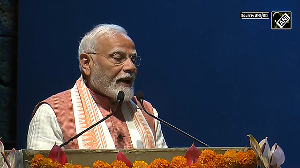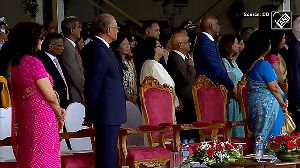Nearly half of the 30 parliamentary seats that go to the polls in the second round in Uttar Pradesh on May 5 will test the political clout of India's most populous state's two political giants Mulayam Singh Yadav of the Samajwadi Party and Kalyan Singh of the Bharatiya Janata Party.
Uttar Pradesh may have as many as 80 seats, but it is on these 30 that the two leaders have much at stake. And it has a lot to do with Kalyan Singh earlier playing spoilsport for the BJP and being a benefactor for the Samajwadi Party.
With last round's exit poll bringing bad news for the BJP, the party leadership was deeply concerned about Wednesday's polling trend, particularly in those parts of central Uttar Pradesh where Kalyan Singh was seen as a factor.
It was Kalyan Singh's estrangement from his own party leadership that had pushed the BJP's tally down in this region to a paltry seven in 1999, while his tacit support to the Samajwadi Party took it to an all-time high tally of 13 seats.
The Bahujan Samaj Party also could not go beyond seven and the Congress stood at just two.
With Kalyan Singh's return to the BJP fold, the party leadership is quite optimistic about a steep upward swing in this region.
Wednesday's poll will, therefore, become a key determinant in the overall tally of both the Samajwadi Party and the BJP. Political analysts are of the view that if Mulayam Singh fails to retain his tally in this region, it could devastate his dreams of playing kingmaker or even king in the event of a hung Parliament.
Clearly, if the BJP succeeds in regaining lost ground with Kalyan Singh's homecoming, it would mean a major boost to the party's prospects in the overall tally.
Even when Kalyan Singh was the BJP chief minister of the state in 1999, he was quite sore with the party's central leadership and had therefore allegedly indulged in sabotaging the interests of his own party.
It was part of a 'secret deal' with Yadav that he let his close associate, the saffron-clad Satchidanand Sakshi Maharaj, switch loyalties and campaign actively for the Samajwadi Party.
With Sakshi Maharaj belonging to the same Lodh backward caste as Kalyan Singh, Yadav could win much support in this community, which has a sizeable numerical strength in large parts of central Uttar Pradesh.
Kalyan Singh's studied silence and a subdued campaign in this region was enough to send the message loud and clear. Eventually, he ensured a major defeat for the BJP in most of the central Uttar Pradesh seats, where Yadav naturally got an edge.
In fact, these reverses prompted the BJP leadership to accelerate Kalyan Singh's ouster from the party, as it became increasingly known that but for his tacit support to Yadav, the saffron party would not have suffered such losses.
Kalyan Singh, who wields considerable influence in at least eight of the 13 constituencies the Samajwadi Party won the last time, could make a significant difference to this crucial round of polling.
fact, the panic in both the BJP and Samajwadi camps was reflected in the heavy concentration of top leaders in these areas until the last minute of campaigning on Monday evening.
Perhaps there is no prominent BJP leader who has not covered large swathes of this region over the past week, while Kalyan Singh has been camping there and making extensive tours of each constituency.
Singh, who earlier never minced words in condemning and running down the BJP, now proudly proclaims, "If the BJP lost those seats because of me, I will see to it that now each of those constituencies goes back to the BJP."
Dismissing his claims, Samajwadi Party politician Azam Khan says, "Kalyan was neither a factor then, nor will he remain a factor now." Another Samajwadi politician argues, "If Kalyan was a factor, why could he not win more than two assembly seats in this area?"
But journalist Hisam Siddiqui, who edits an Urdu weekly, reasons, "Kalyan may not be a factor where winning seats is concerned; but he was and will continue to remain a formidable force to spell anybody's defeat in that region. And that is what he will do to Mulayam this time."
Evidently, therefore, the tug-of-war in this belt will remain largely confined to the Samajwadi Party and the BJP. Both the BSP and the Congress are unlikely to witness any noticeable change in their political fortunes in this round. They will be satisfied if they retain their existing seats.






 © 2025
© 2025